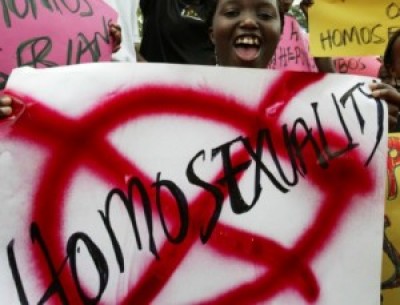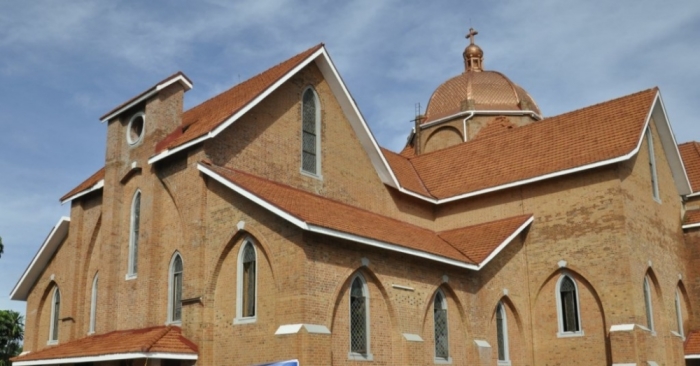Church of Uganda Explains Support for Controversial Anti-Homosexuality Law

As Uganda continues to face international outrage over its Anti-Homosexuality Act, which was signed into law earlier this year, The Christian Post sought to get a better understanding of not only the bill but also how the churches in the East African country came to support it.
Read U.S. Evangelicals' opposition to the Uganda Anti-Homosexuality Act here and here.
A spokesperson with the Church of Uganda (part of the Anglican Communion) answered questions from CP regarding the church's position on the law, its opinion of the law, and regarding American opposition. The spokesperson, who requested to remain anonymous, stated that they "honestly don't understand" the outrage.
The spokesperson admitted that the Act, signed by Ugandan President Yoweri Museveni, may seem "draconian" to those whose "point of reference is the Western world's rapid adoption of same-sex marriage." But to others, whose point of reference is Uganda's existing laws when the bill was passed, the new law changes nothing.
In actuality, the new law "mitigates punishment for aggravated homosexuality/defilement," the spokesperson said.
The Church of Uganda helped get the bill amended to remove the death penalty for "aggravated homosexuality" and the provision that those in authority who become aware of practices of homosexuality must report it within 24 hours.
Below are excerpts from the responses given via email from the spokesperson.
It was widely reported that the Church of Uganda supported the new law. What is the Church of Uganda's position on the new law?
We have heard many stories from youth and young adults of homosexual rape taking place in boarding schools. Once the young boy is raped, he is told that he can get money or school fees if he continues. Together with the president, parents, and other religious leaders, the Church of Uganda considers this to be "recruiting" into homosexuality and feels an obligation to defend her children from such exploitation.
We have also heard stories of people going on to university campuses promising jobs in other countries. Students struggling financially accept the offers of foreign jobs, only to reach the foreign country and find that their passports are taken and they are consigned to a life of homosexual prostitution. The Church of Uganda, together with other national leaders, considers such human trafficking to be "recruiting" into homosexuality and is steadfastly opposed to it.
We have heard stories of community leaders, teachers, and even pastors, who seduce children and adolescents of the same sex into homosexual acts in exchange for favors, passing grades, money or spiritual power. We believe such corruption and perversion to be not only immoral, but also criminal, and appreciate the Anti-Homosexuality Act for proscribing these behaviors that "recruit" others into homosexuality.
For those who have been homosexually raped, or victimized by pedophilia or human trafficking, the Church of Uganda seeks not only to support the criminalization of those acts, but, at the same time, to offer counseling and pastoral care for those who have been victimized. In their victimization they have been stigmatized and cast out of their families. They often fear disclosing the shameful life they have been forced to live. The Church of Uganda wants to assure them of a safe place to share their story, and to find hope and healing for a new life in Christ.
The original Anti-Homosexuality Bill called for those in authority who became aware of practices of homosexuality to report it within 24 hours, and, if they didn't report it, they would be charged and could be imprisoned for up to three years. The Church of Uganda was opposed to this provision in the original bill because it violated the church's pastoral calling to offer forgiveness and counseling to those who have strayed from God's ways.
The original bill also called for the death penalty for aggravated homosexuality, which included such crimes as homosexual rape, homosexual incest, engaging in homosexual sex when HIV positive, administering a "date rape" drug in order to commit homosexual rape, homosexual sex demanded by someone in a power relationship or a relationship of authority over another (sexual harassment), and those who have been convicted of charges under this bill more than once (defined in the bill as a "serial offender"). The Church of Uganda recognized that the Western world criminalizes almost all of these same offenses, though the Western world may not define them as "aggravated homosexuality." So the Church of Uganda supported the criminalizing of these offenses, but it was opposed to the death penalty as the prescribed punishment.
Although the Church of Uganda was sympathetic with the concerns behind the bill, for the reasons described above, it was originally opposed to the bill because of these two provisions.
When Parliament listened to our concerns and amended the bill by removing the clause requiring professionals to report practices of homosexuality and removed the death penalty, the Church of Uganda changed its position and joined with all the other leaders of religious groups in the country to support the bill and encouraged the president to sign it.
The Church of Uganda also supports the bill – now Act – because it seeks to protect its people from the worldview or "narrative" that often accompanies gay activism. There is a prevailing ideology among gay activists that seeks to deconstruct the biblical understanding of man and woman, male and female, human nature, natural law, and marriage, among other things. Our perception is that to accept homosexuality is to also accept this ideology that goes with it; it is a "package deal" and seems to be a modern-day manifestation of the ancient heresy of Gnosticism. The prevailing ideology of gay activists not only undermines the Bible's message, which is deliberate on their part, but it is also an attack on the foundations of our society.
So, as a church, we support Uganda's national sovereignty and our right to self-determination in establishing this law, and will not bow to international pressure to change that part of our culture that aligns with our biblical convictions.
While you didn't ask about it, we would like to add that we are opposed to any "mob justice" or vigilante approach on the part of ordinary citizens who are trying to "help" law enforcement do their job. Violence by one person against another is not acceptable, for any reason.

It was widely reported that the Church of Uganda sought to break ties with its western Churches over differences on the new law. What relationship does the Church of Uganda have with the Anglican Communion in developed nations and has there been an effort to break away from said churches due to this new law?
The Church of Uganda broke communion with the Episcopal Church USA and the Anglican Church of Canada in 2003, long before the Anti-Homosexuality Bill was proposed to Parliament. The Church of Uganda broke communion with these two North American churches because of their violation of Scripture and the common agreements in the Anglican Communion to not consecrate as bishops people living in same-sex relationships and to not bless same-sex unions. Both of those churches have continued on the same trajectory, so, sadly, the relationships remain broken.
Since the establishment of the Anglican Church in North America in 2009, the Church of Uganda has entered into full communion with it.
The Church of Uganda has not broken its relationship with the Church of England, as was widely reported in the media. It is true that we are concerned about the level of vocal support for the blessing of same-sex unions and same-sex marriage on the part of some Church of England clergy and bishops. We are equally concerned about the possibility of the Church of England adopting the blessing of same-sex unions at the end of their two-year process of "facilitated conversations." We are also concerned about the House of Bishops Pastoral Letter allowing clergy to use "pastoral discretion" in welcoming same-sex couples and offering "informal prayers" for them. We have expressed our concerns and are praying for the Church of England to remain true to the faith she has received from her forebears.




























